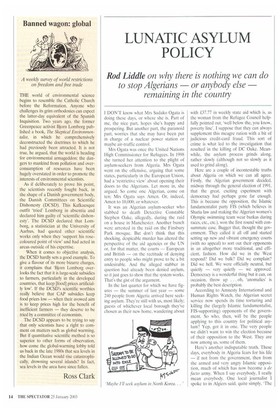Banned wagon: global
A weekly survey of world restrictions on freedom and free trade
THE world of environmental science begins to resemble the Catholic Church before the Reformation. Anyone who challenges its grim orthodoxies can expect the latter-day equivalent of the Spanish Inquisition. Two years ago, the former Greenpeace activist Bjorn Lomborg published a book, The Skeptical Environmentalist, in which he comprehensively deconstructed the doctrines to which he had previously been attracted. It is not true, he argued, that the world is heading for envimnrnental armageddon: the clangers to mankind from pollution and overconsumption of resources have been hugely overstated in order to promote the interests of environmental scientists.
As if deliberately to prove his point, the scientists recently fought back, in the shape of a Danish government body, the Danish Committees on Scientific Dishonesty (DCSD). This Kafkaesque outfit 'tried' Lomborg in absentia and declared him guilty of 'scientific dishonesty'. The DCSD declared that Lomborg, a statistician at the University of Aarhus, had quoted other scientific works only when they 'support his rosecoloured point of view' and had acted in areas outside of his expertise.
When it comes to objective analysis, the DCSD hardly sets a good example. To give a flavour of its more bizarre charges, it complains that 'Bjorn Lomborg overlooks the fact that it is large-scale subsidies to farmers, particularly in the developed countries, that keep [food] prices artificially low". If the DCSD's scientific worthies really believe that CAP subsidies keep food prices low — when their avowed aim is to keep prices high for the benefit of inefficient farmers — they deserve to be tried by a committee of economists.
The DCSD appears to be trying to say that only scientists have a right to comment on matters such as global warming. But if quantitative scientific method is so superior to other forms of observation, how come the global-warming lobby told us back in the late 1980s that sea levels in the Indian Ocean would rise catastrophically, drowning several islands? In fact, sea levels in the area have since fallen.
Ross Clark


















































































 Previous page
Previous page